Week in Freethought History (August 5-11)
Here’s your Week in Freethought History: This is more than just a calendar of events or mini-biographies – it’s a reminder that, no matter how isolated and alone we may feel at times, we as freethinkers are neither unique nor alone in the world.
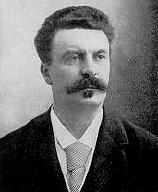 Last Sunday, August 5, but in 1850, French naturalistic writer Guy de Maupassant was born. Between 1880 and 1891 Maupassant wrote about 300 short stories (a literary form that he mastered), some six novels and many poems – totaling about 29 volumes when published 1908-1910. His stories include “Ball of Fat,” which made his literary reputation and may have been the inspiration for John Ford's 1945 western, Stagecoach – which in turn made the reputation of a struggling young actor named John Wayne. Another short story, “The Inn,” may have inspired Steven King's 1977 novel, The Shining. His “Clair de Lune,” and most of the rest of his literary efforts, express a deep religious skepticism, if not outright Atheism. Guy de Maupassant once said, “Patriotism is a kind of religion; it is the egg from which wars are hatched.”
Last Sunday, August 5, but in 1850, French naturalistic writer Guy de Maupassant was born. Between 1880 and 1891 Maupassant wrote about 300 short stories (a literary form that he mastered), some six novels and many poems – totaling about 29 volumes when published 1908-1910. His stories include “Ball of Fat,” which made his literary reputation and may have been the inspiration for John Ford's 1945 western, Stagecoach – which in turn made the reputation of a struggling young actor named John Wayne. Another short story, “The Inn,” may have inspired Steven King's 1977 novel, The Shining. His “Clair de Lune,” and most of the rest of his literary efforts, express a deep religious skepticism, if not outright Atheism. Guy de Maupassant once said, “Patriotism is a kind of religion; it is the egg from which wars are hatched.”
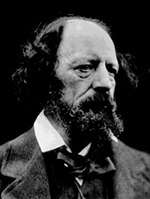 Last Monday, August 6, but in 1809, Victorian English poet Alfred, first Baron Tennyson, was born. Commonly known as Alfred, Lord Tennyson, he wasn't a Lord until 1884. Alfred began writing poetry at age 8. He took a poetry prize in 1829 by besting William Makepeace Thackeray. He and Thackeray became friends, anyway. In many poems, Tennyson uses theistic language to express essentially Pantheistic views, which he shared with his college mates, FitzGerald, Hallam and Thackeray. It is commonly assumed that Tennyson was an orthodox believer, but there are strong reasons to conclude that he doubted immortality – his wife quotes him saying, “About a future life we know hardly anything” – and rejected important Christian doctrines. It was Tennyson who said, “We have but faith: we cannot know; For knowledge is of things we see” (In Memoriam, dedicated to Hallam).
Last Monday, August 6, but in 1809, Victorian English poet Alfred, first Baron Tennyson, was born. Commonly known as Alfred, Lord Tennyson, he wasn't a Lord until 1884. Alfred began writing poetry at age 8. He took a poetry prize in 1829 by besting William Makepeace Thackeray. He and Thackeray became friends, anyway. In many poems, Tennyson uses theistic language to express essentially Pantheistic views, which he shared with his college mates, FitzGerald, Hallam and Thackeray. It is commonly assumed that Tennyson was an orthodox believer, but there are strong reasons to conclude that he doubted immortality – his wife quotes him saying, “About a future life we know hardly anything” – and rejected important Christian doctrines. It was Tennyson who said, “We have but faith: we cannot know; For knowledge is of things we see” (In Memoriam, dedicated to Hallam).
 It was also on August 6, but in 1973, that that the erotic actress and MENSA member, with an IQ of 156, Asia Carrera was born Jessica Andrea Steinhauser to a Japanese father and a German mother. Eurasian genes and some cosmetic surgery contributed to her stunning good looks, which caused her to be “discovered” by erotic film director Bud Lee, who cast her in her first film. She married Lee in 1995, starred in or featured in over 270 films, and divorced Lee but remained friends in 2003. Currently retired, this self-styled computer geek idolizes Berkshire Hathaway CEO Warren Buffet. Both Buffet and Carrera are atheists. About her beliefs, Asia says, “I've always been an atheist. Science explains everything. There is no meaning in life except to be the best at something.” And, “Religion is silly. When you're dead, you turn into a source for future flowers and plants.”
It was also on August 6, but in 1973, that that the erotic actress and MENSA member, with an IQ of 156, Asia Carrera was born Jessica Andrea Steinhauser to a Japanese father and a German mother. Eurasian genes and some cosmetic surgery contributed to her stunning good looks, which caused her to be “discovered” by erotic film director Bud Lee, who cast her in her first film. She married Lee in 1995, starred in or featured in over 270 films, and divorced Lee but remained friends in 2003. Currently retired, this self-styled computer geek idolizes Berkshire Hathaway CEO Warren Buffet. Both Buffet and Carrera are atheists. About her beliefs, Asia says, “I've always been an atheist. Science explains everything. There is no meaning in life except to be the best at something.” And, “Religion is silly. When you're dead, you turn into a source for future flowers and plants.”
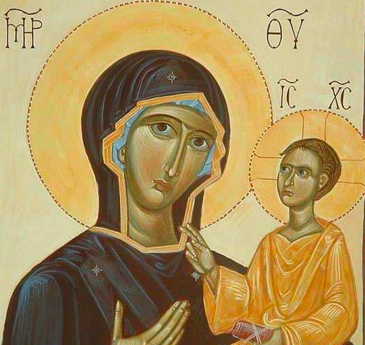 Last Tuesday, August 7, but in 1555, Pope Paul IV, newly elected and nearly 80, issued an Ecclesiastical Constitution called “Cum quorundam,” making it an article of faith that Mary, the mother of Jesus, “was a virgin before, during, and after the conception and birth of her” son. What is rarely asked is: why did Mary necessarily have to be a virgin? What is it about virginity that it is glorified, when is it not fetishized? The idea of virginity, chastity and abstinence being somehow blessed and desirable is further proof that Christianity borrowed the worst ideas from the pagans from which to fabricate their religion. The oldest forms of worship were animist or Pantheist: the worship of the bounty of Mother Earth, the harvest, and so on. The fertility of humans being as important as that of cattle, this matriarchal religion, along with phallic elements, was a natural result. However, a competing religious idea arose in the Mediterranean, that of a Sky-God. The Sky-God pronounced the flesh evil. By the sixth century BCE, the idea was thoroughly developed in Persia with Ahura Mazda. Christianity was only one of many religions to adopt asceticism as a virtue and the degradation of women (and the Earth) as fidelity to the Sky-God. Historically and practically, asceticism and celibacy are no more natural than fasting and flagellation. And the denial of fundamental human needs leads to lying, perversion, and disrespect for authority. Abstinence for the sake of some negligible notion of purity is also pointless.
Last Tuesday, August 7, but in 1555, Pope Paul IV, newly elected and nearly 80, issued an Ecclesiastical Constitution called “Cum quorundam,” making it an article of faith that Mary, the mother of Jesus, “was a virgin before, during, and after the conception and birth of her” son. What is rarely asked is: why did Mary necessarily have to be a virgin? What is it about virginity that it is glorified, when is it not fetishized? The idea of virginity, chastity and abstinence being somehow blessed and desirable is further proof that Christianity borrowed the worst ideas from the pagans from which to fabricate their religion. The oldest forms of worship were animist or Pantheist: the worship of the bounty of Mother Earth, the harvest, and so on. The fertility of humans being as important as that of cattle, this matriarchal religion, along with phallic elements, was a natural result. However, a competing religious idea arose in the Mediterranean, that of a Sky-God. The Sky-God pronounced the flesh evil. By the sixth century BCE, the idea was thoroughly developed in Persia with Ahura Mazda. Christianity was only one of many religions to adopt asceticism as a virtue and the degradation of women (and the Earth) as fidelity to the Sky-God. Historically and practically, asceticism and celibacy are no more natural than fasting and flagellation. And the denial of fundamental human needs leads to lying, perversion, and disrespect for authority. Abstinence for the sake of some negligible notion of purity is also pointless.
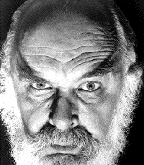 Also last Tuesday, but in 1928, Canadian-American magician and psychic debunker James “The Amazing” Randi was born. From the 1950s he toured the world as a magician, stage mentalist and escape artist, like his idol, Houdini, and developed a strong skepticism toward psychics. Randi was a founding fellow of the Committee for the Scientific Investigation of Claims of the Paranormal (CSICOP), based in Buffalo, NY, a non-profit organization devoted to the critical examination of paranormal and supernatural claims. As for his personal beliefs, in Randi's 1989 book The Faith Healers, he writes, “I am frequently approached following lectures and loudly asked if I am a Christian and/or whether I believe in God – the assumption being that I understand what the questioner means by both terms. My answer has always been that I have found no compelling reason to adopt such beliefs.”
Also last Tuesday, but in 1928, Canadian-American magician and psychic debunker James “The Amazing” Randi was born. From the 1950s he toured the world as a magician, stage mentalist and escape artist, like his idol, Houdini, and developed a strong skepticism toward psychics. Randi was a founding fellow of the Committee for the Scientific Investigation of Claims of the Paranormal (CSICOP), based in Buffalo, NY, a non-profit organization devoted to the critical examination of paranormal and supernatural claims. As for his personal beliefs, in Randi's 1989 book The Faith Healers, he writes, “I am frequently approached following lectures and loudly asked if I am a Christian and/or whether I believe in God – the assumption being that I understand what the questioner means by both terms. My answer has always been that I have found no compelling reason to adopt such beliefs.”
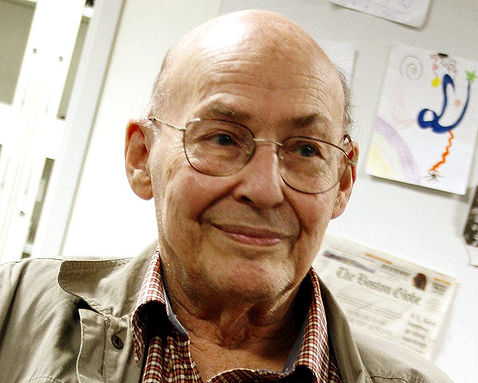 Last Thursday, August 9, but in 1927, MIT professor Marvin Minsky, known in computer science as the father of artificial intelligence, was born. His most notable works are The Society of Mind (1987), the first comprehensive description of the Society of Mind theory of intellectual structure and development, and its sequel, The Emotion Machine (2006). Both books take a purely materialistic approach to human mind and its function as a neural network. Indeed, the Society of Mind theory explains intelligence is a product of non-intelligent component parts. In the book of that title, Minsky wrote, “All human cultures evolve institutions of law, religion, and philosophy, and these institutions both adopt specific answers to circular questions and establish authority – schemes to indoctrinate people with those beliefs. One might complain that such establishments substitute dogma for reason and truth. But in exchange, they spare whole populations from wasting time in fruitless reason loops. Minds can lead more productive lives when working on problems that can be solved.”
Last Thursday, August 9, but in 1927, MIT professor Marvin Minsky, known in computer science as the father of artificial intelligence, was born. His most notable works are The Society of Mind (1987), the first comprehensive description of the Society of Mind theory of intellectual structure and development, and its sequel, The Emotion Machine (2006). Both books take a purely materialistic approach to human mind and its function as a neural network. Indeed, the Society of Mind theory explains intelligence is a product of non-intelligent component parts. In the book of that title, Minsky wrote, “All human cultures evolve institutions of law, religion, and philosophy, and these institutions both adopt specific answers to circular questions and establish authority – schemes to indoctrinate people with those beliefs. One might complain that such establishments substitute dogma for reason and truth. But in exchange, they spare whole populations from wasting time in fruitless reason loops. Minds can lead more productive lives when working on problems that can be solved.”
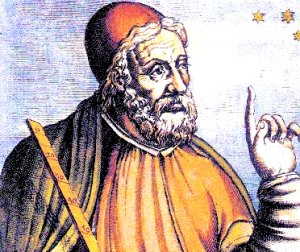 Yesterday, August 10, but in 1675, by order of King Charles II, the foundation stone of the Royal Observatory at Greenwich, south London, was laid. The churches still, both Catholic and Protestant, were unready to relinquish their hold on not only how to go to heaven, but how the heavens go. Believing that the world would soon end, the early church was (in fact) indifferent to “how the heavens go.” The Christian belief is that the universe was created by God; the heavens are a solid hemisphere, a "firmament," from which angels hung the greater and lesser lights – the sun, moon and stars. The earth stands immobile at the center of the universe. This “Ptolemaic theory,” based on the revered writings of Claudius Ptolemy (Κλαύδιος Πτολεμαῖος; 85-165 CE) and his predecessor Aristotle (Ἀριστοτέλης; 384-322 BCE), became the sacred science of the Christian churches.
Yesterday, August 10, but in 1675, by order of King Charles II, the foundation stone of the Royal Observatory at Greenwich, south London, was laid. The churches still, both Catholic and Protestant, were unready to relinquish their hold on not only how to go to heaven, but how the heavens go. Believing that the world would soon end, the early church was (in fact) indifferent to “how the heavens go.” The Christian belief is that the universe was created by God; the heavens are a solid hemisphere, a "firmament," from which angels hung the greater and lesser lights – the sun, moon and stars. The earth stands immobile at the center of the universe. This “Ptolemaic theory,” based on the revered writings of Claudius Ptolemy (Κλαύδιος Πτολεμαῖος; 85-165 CE) and his predecessor Aristotle (Ἀριστοτέλης; 384-322 BCE), became the sacred science of the Christian churches.
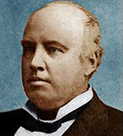 Today, August 11, but in 1883, the “Great Agnostic,” Robert Green Ingersoll, was born. The most eloquent advocate of Freethought in the 19th century, Ingersoll trained in the law before enlisting in the Union Army during the Civil War, where he was a Colonel in the cavalry and fought in the Battle of Shiloh. He was captured and paroled and later served as the first Attorney General of Illinois. From 1865 to 1899, in an age when public lectures were the equivalent of pop concerts today, he was the 19th century equivalent of a pop star. Ingersoll’s topics ran from Shakespeare and Burns to the Bible, religion and science. He also argued for the rights of women, workers and blacks, as well as for the theory of evolution. His anti-religious orations drew the biggest crowds – and he purposely gave them on Sunday and charged rock-concert prices. Ingersoll preferred to call himself an Agnostic, though he admitted there was little difference between that and Atheism. Audiences in nearly every town in America would hear such things as: “It is contended by many that ours is a Christian government, founded upon the Bible, and that all who look upon the book as false or foolish are destroying the foundation of our country. The truth is, our government is not founded upon the rights of gods, but upon the rights of men.” And, “When the theologian governed the world, it was covered with huts and hovels for the many, palaces and cathedrals for the few. … The day of Science dawned, and the luxuries of a century ago are the necessities of to-day. … These benefits did not drop from the outstretched hands of priests. … They were not discovered by the closed eyes of prayer, nor did they come in answer to superstitious supplication. They are the children of freedom, the gifts of reason, observation and experience – and for them all, man is indebted to man.”
Today, August 11, but in 1883, the “Great Agnostic,” Robert Green Ingersoll, was born. The most eloquent advocate of Freethought in the 19th century, Ingersoll trained in the law before enlisting in the Union Army during the Civil War, where he was a Colonel in the cavalry and fought in the Battle of Shiloh. He was captured and paroled and later served as the first Attorney General of Illinois. From 1865 to 1899, in an age when public lectures were the equivalent of pop concerts today, he was the 19th century equivalent of a pop star. Ingersoll’s topics ran from Shakespeare and Burns to the Bible, religion and science. He also argued for the rights of women, workers and blacks, as well as for the theory of evolution. His anti-religious orations drew the biggest crowds – and he purposely gave them on Sunday and charged rock-concert prices. Ingersoll preferred to call himself an Agnostic, though he admitted there was little difference between that and Atheism. Audiences in nearly every town in America would hear such things as: “It is contended by many that ours is a Christian government, founded upon the Bible, and that all who look upon the book as false or foolish are destroying the foundation of our country. The truth is, our government is not founded upon the rights of gods, but upon the rights of men.” And, “When the theologian governed the world, it was covered with huts and hovels for the many, palaces and cathedrals for the few. … The day of Science dawned, and the luxuries of a century ago are the necessities of to-day. … These benefits did not drop from the outstretched hands of priests. … They were not discovered by the closed eyes of prayer, nor did they come in answer to superstitious supplication. They are the children of freedom, the gifts of reason, observation and experience – and for them all, man is indebted to man.”
We can look back, but the Golden Age of Freethought is now. You can find full versions of these pages in Freethought history at the links in my blog, FreethoughtAlmanac.com.

